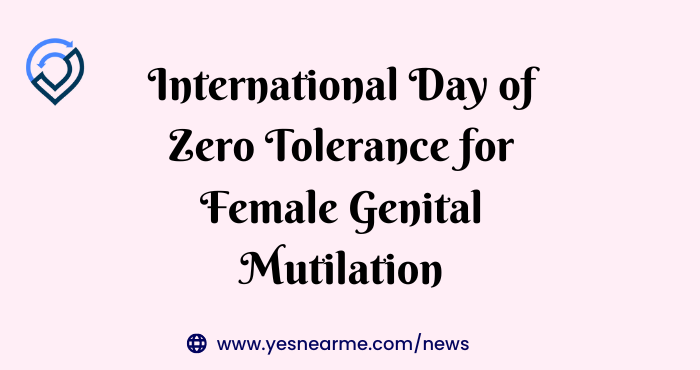International Day of Zero Tolerance for Female Genital Mutilation (FGM)
The International Day of Zero Tolerance for Female Genital Mutilation (FGM) is observed every year on February 6 to raise awareness about the harmful practice of FGM and to advocate for its global elimination. The day serves as a call to action to combat this harmful practice, protect the rights of women and girls, and ensure their well-being.
 Background and Purpose
Background and Purpose
-
Established by the United Nations (UN): The International Day of Zero Tolerance for Female Genital Mutilation was introduced by the United Nations (UN) in 2003 to highlight the urgent need to end FGM and its harmful effects on women and girls globally.
-
Raising Awareness: The day aims to increase public awareness about the physical, psychological and social consequences of FGM, promote the health and human rights of women and girls and create global pressure to end the practice.
-
Focus on Global Action: The day encourages governments, communities, and organizations to take steps to eradicate Female Genital Mutilation, engage in discussions to challenge harmful cultural norms and provide support for survivors of Female Genital Mutilation.
What is Female Genital Mutilation (FGM)?
-
Definition:Zero Tolerance for Female Genital Mutilation involves the partial or total removal of the external female genitalia for non-medical reasons. It is often carried out on young girls between the ages of infancy and 15, typically in a non-clinical setting.
-
Types of Female Genital Mutilation:
- Type I: Clitoridectomy (partial or total removal of the clitoris).
- Type II: Excision (removal of the clitoris and labia minora).
- Type III: Infibulation (narrowing of the vaginal opening by stitching or removing part of the genitalia).
- Type IV: Other harmful procedures (e.g., pricking, piercing, or scraping the genital area).
-
Physical and Psychological Effects:
- Health Consequences: FGM can cause immediate and long-term health issues, including chronic pain, infection, infertility, childbirth complications and psychological trauma. In severe cases, it can lead to death.
- Psychological Effects: Female Genital Mutilation often leads to depression, anxiety, post-traumatic stress disorder (PTSD), and difficulties in relationships and sexual health.
Global Impact of Female Genital Mutilation
-
Prevalence: Female Genital Mutilationaffects more than 200 million women and girls worldwide, particularly in 30 countries across Africa, the Middle East and parts of Asia. It is also found in some migrant communities in Europe, North America and Australia.
-
Cultural and Societal Roots: Female Genital Mutilation is often perpetuated due to cultural, religious and social beliefs. It is sometimes seen as a rite of passage, a way to maintain virginity or a means of controlling women’s sexuality.
 Objectives of the Zero Tolerance for FGM
Objectives of the Zero Tolerance for FGM
-
Raise Awareness: The day aims to educate people about the harmful effects of Female Genital Mutilation and the importance of ending the practice to protect the health and rights of girls and women.
-
Advocacy for Legal Protections: Encourages governments to strengthen laws against Female Genital Mutilation and ensure that laws are enforced to protect girls and women from this practice.
-
Promote Action and Solidarity: The day encourages governments, civil society, communities, and individuals to take collective action to eliminate Female Genital Mutilation through education, legislation and community engagement.
-
Support Survivors: Highlight the need for care, support, and rehabilitation for women and girls who have undergone Female Genital Mutilation addressing their physical health and mental well-being.
-
Advocate for Gender Equality: The day also ties into efforts to eliminate gender-based violence and promote gender equality, as Female Genital Mutilation is rooted in discriminatory practices that harm girls and women.
Key Global Organizations Involved
-
United Nations (UN): The UN plays a central role in raising awareness, providing technical assistance and supporting countries in eliminating Female Genital Mutilation. The UNFPA (United Nations Population Fund) and UNICEF are major contributors to the global movement to end FGM.
-
World Health Organization (WHO): WHO provides resources, research and guidance to countries on the health risks of Female Genital Mutilation and helps build capacities to eliminate it.
-
African Union (AU): The African Union has taken significant steps to address FGM, including the African Charter on Human and Peoples’ Rights which prohibits Female Genital Mutilation.
-
NGOs and Community-Based Organizations: Numerous organizations like Tostan, Amref Health Africa, and Equality Now work at the grassroots level to end FGM through education, community engagement, and advocacy.
Progress in the Fight Against FGM
-
Global Commitment: In 2012, the UN General Assembly declared a resolution calling for the elimination of FGM, marking a major step in global recognition of the issue.
-
Sustainable Development Goal (SDG) 5: The UN’s Sustainable Development Goal 5 specifically aims to end all harmful practices, including FGM, by 2030. Achieving this target requires a collective effort to provide education, change societal attitudes, and enforce laws against the practice.
-
Community-Based Programs: Several communities that practiced FGM have made significant strides in abandoning the practice. For example, Tostan’s community empowerment programs have helped thousands of villages in Senegal and other parts of Africa to voluntarily abandon FGM.
-
Legislation: More countries are introducing anti-FGM laws, and legal frameworks against FGM are gradually being strengthened. However, the implementation and enforcement of these laws remain a challenge in some regions.
 Challenges in Ending FGM
Challenges in Ending FGM
-
Cultural Resistance: FGM is often deeply embedded in cultural practices, and there is resistance to abandoning it due to long-standing beliefs about its social and cultural importance.
-
Lack of Education and Awareness: Many communities may not be fully aware of the health risks and human rights violations associated with FGM, making education and awareness campaigns crucial.
-
Lack of Access to Health Services: In regions where FGM is prevalent, access to healthcare and mental health services for survivors is often limited, making it harder to provide necessary care.
-
Weak Enforcement of Laws: While many countries have enacted laws against FGM, enforcement is often weak, and the practice continues in some communities despite legal prohibitions.
How You Can Get Involved
-
Educate Yourself and Others: Learn more about FGM, its effects, and the efforts being made to eliminate it. Share this knowledge with your community.
-
Support Organizations: Support NGOs and community-based organizations that are working to end FGM, whether through donations, volunteer work, or spreading awareness.
-
Advocate for Policy Change: Advocate for stronger laws against FGM and better protection for women and girls in your community, country, or internationally.
-
Support Survivors: Provide emotional, medical, and psychological support to survivors of FGM, helping them heal from the trauma they have experienced.
Key Aspects of “A World Without FGM: Empowering Women and Girls”
-
Understanding FGM and Its Impact:
- Zero Tolerance for Female Genital Mutilation involves the partial or total removal of the external female genitalia for non-medical reasons. It can lead to severe health complications, including chronic pain, infection, infertility, childbirth difficulties, and even death. FGM also leads to long-term psychological trauma, including depression, anxiety, and post-traumatic stress disorder (PTSD).
- The practice is often done in an effort to control women’s sexuality, maintain social traditions, or ensure marriageability in certain cultures. These deeply entrenched beliefs undermine women’s autonomy and perpetuate gender inequality.
-
Empowering Women and Girls:
- Empowerment means giving women and girls the freedom to make decisions about their own lives, bodies, and futures. A world without FGM signifies a society where girls grow up free from the physical and emotional scars of this harmful practice, leading to greater independence, confidence, and self-determination.
- Empowered girls are more likely to pursue education, have access to better healthcare, and be able to make choices that positively impact their futures. They are also better equipped to stand up for their rights and challenge harmful cultural practices like FGM.
-
Awareness and Advocacy:
- Raising awareness is one of the central goals of a day dedicated to empowering women and girls. This includes educating people about the dangers of FGM and the benefits of gender equality. Campaigns on February 6—the International Day of Zero Tolerance for FGM—mobilize governments, civil society organizations, and grassroots movements to publicly commit to ending FGM.
- Advocating for laws that ban FGM and ensure equal protection for women and girls is crucial. Many countries have already passed anti-FGM laws, but enforcing them and ensuring accountability remains a challenge.
-
The Role of Community Engagement:
- In many regions where FGM is prevalent, it is seen as a cultural tradition, which means that eradicating the practice requires changing societal attitudes. Community engagement and dialogue are essential in this process.
- Working with local leaders, including elders, religious figures, and community activists, can be key in challenging the cultural norms that perpetuate FGM. Community-based education programs have led to positive results, where entire villages have agreed to abandon FGM voluntarily.
-
Support for Survivors:
- Empowerment is also about providing support for survivors of FGM. Many women and girls who have undergone FGM live with long-term physical and emotional consequences. Offering medical care, mental health support, and safe spaces for healing is a vital part of empowerment.
- Rehabilitation programs help survivors reintegrate into their communities and live fulfilling lives free from stigma and discrimination.
-
Global Solidarity and Commitment:
- Ending FGM is not only a local or national issue but a global challenge. The international community, including UNICEF, WHO, UNFPA, and NGOs, plays a significant role in supporting efforts to eliminate FGM through advocacy, funding, and policy guidance.
- The UN Sustainable Development Goal 5 explicitly calls for the elimination of all harmful practices, including FGM, by 2030. This commitment reflects the global recognition that ending FGM is essential for achieving gender equality and empowering women and girls worldwide.
-
Education and Empowerment for the Next Generation:
- One of the most powerful tools in eliminating FGM is education. Girls and boys need to be educated about the dangers of FGM, its violation of human rights, and the importance of gender equality.
- As more girls are educated and empowered, they become powerful agents of change within their communities, helping to spread awareness and lead the charge in advocating for the abandonment of FGM.
Steps Toward a World Without FGM
-
Strengthening Legislation:
- Governments around the world must enforce strict laws against FGM, ensure that offenders are prosecuted, and provide resources for victims of FGM to seek justice.
- Legal frameworks should be coupled with awareness campaigns to educate people about the legal consequences of FGM.
-
Community-Based Education and Engagement:
- Community-based programs are essential to change the narrative around FGM. Working with communities to highlight the harmful consequences and promote alternatives is critical to long-term change.
- Involve local leaders, teachers, and healthcare workers in spreading awareness and encouraging the abandonment of the practice.
-
Support Networks for Survivors:
- Creating a safe space for survivors of FGM to heal physically and emotionally is vital. This can be done through mental health services, social services, and support groups where survivors can share their experiences, seek help, and rebuild their lives.
-
Global Collaboration:
- Countries, NGOs, and international organizations must continue to collaborate to build momentum for the eradication of FGM. This can include cross-border efforts in regions where migration has led to the spread of FGM and international policy advocacy.
-
Empowering Women Through Education:
- Ensuring that every girl has access to quality education is one of the most effective ways to empower girls and protect them from practices like FGM. Educated girls are better able to make informed decisions about their bodies and futures, thus reducing the incidence of FGM.
Quotes on International Day of Zero Tolerance for Female Genital Mutilation in English
“Women’s loyalty has to be earned with trust and affection, rather than barbaric rituals.
The time has come to leave the old ways of suffering behind.” (Waris Dirie)
“I always knew, from the very day of my own mutilation, that I would one day fight against this practice.
I did not know how and when, but I knew that I would fight it.” Waris Dirie
“I know what I am fighting for. I am fighting for the most basic rights of innocent children.
And that is why I never take the criticism too deep under my skin.” (Waris Dirie)
“We should not be followers of traditions that go against human rights…we are human beings and we make traditions.” (Malal Yousafzai)
“The best way to make a girl to abstain from pre-marital sex is not by cutting her genital,
but by educating and mentoring her” – Joseph Osuigwe Chidiebere
“To cut off the sensitive sexual organ of a girl is directly against the honesty of nature,
a distortion to her womanhood, and an abuse of her fundamental human right”- Joseph Osuigwe Chidiebere
“Girls are well created, and it is unnecessary and irrelevant to cut any part of their bodies”- Joseph Osuigwe Chidiebere
Circumcisers make money from cutting girls/women, and girls/women (victims) spend money treating health complications of Female Genital Mutilation- Joseph Osuigwe Chidiebere
“You or any of your family members may not have practiced female genital mutilation, but that is not enough reason to keep silent about it. You need to speak out against it to discourage others from the practice”- Joseph Osuigwe Chidiebere
Zero Tolerance for Female Genital Mutilation Quotes In Hindi
“महिलाओं की वफादारी को बर्बर रीति-रिवाजों के बजाय विश्वास और स्नेह के साथ अर्जित करना होगा।
समय आ गया है कि पुराने तरीकों को पीछे छोड़ दिया जाए।” (वारिस डेरी)
“मैं अपने अंगभंग के दिन से ही जानता था कि एक दिन मैं इस प्रथा के खिलाफ लड़ूंगा।
मुझे नहीं पता था कि कैसे और कब, लेकिन मुझे पता था कि मैं इससे लड़ूंगा।” वारिस डिरी
“मुझे पता है कि मैं किसके लिए लड़ रहा हूं। मैं मासूम बच्चों के सबसे बुनियादी अधिकारों के लिए लड़ रहा हूं।
और यही कारण है कि मैं कभी भी आलोचना को अपनी त्वचा के नीचे नहीं लेता।” (वारिस डेरी)
“हमें उन परंपराओं का अनुयायी नहीं होना चाहिए जो मानवाधिकारों के खिलाफ जाती हैं… हम इंसान हैं और हम परंपराएं बनाते हैं।” (मलाल युसुफजई)
Conclusion
Zero Tolerance for Female Genital Mutilation comprises all practices that involve altering or injuring the female genitalia for non-medical reasons and is an international violation of the human rights of girls and women.
more read https://yesnearme.com/news/







Recent Comments